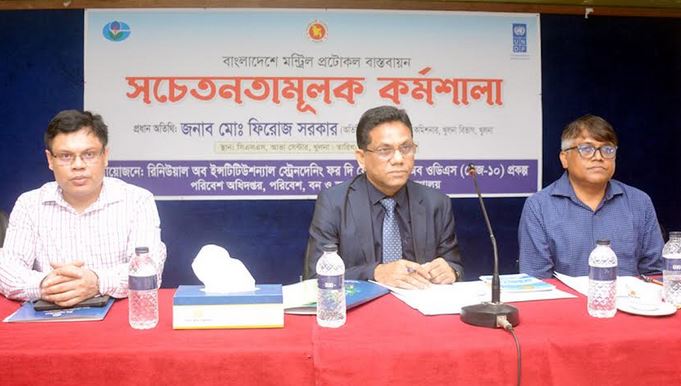News Flash

KHULNA, June 01, 2025 (BSS) - An awareness workshop on the implementation of the Montreal Protocol for the protection of the ozone layer was held today at the CSS Ava Center in Khulna City.
The workshop was organized under the "Renewal of Institutional Strengthening for the Phase-Out of ODS (Phase-10)" project, implemented by the Department of Environment (DoE).
Speaking as the chief guest, the Divisional Commissioner of Khulna Md. Firoz Sarkar said that Bangladesh has played a significant role in meeting the targets of phasing out ozone-depleting substances under the Montreal Protocol.
He emphasized the importance of raising awareness about actions needed under the changing circumstances. Stakeholders should be encouraged to use refrigerant gases that are not harmful to the environment.
He further pointed out that ozone-depleting substances not only harm the ozone layer but also contribute significantly to climate change.
Due to the impact of climate change, the southern region of Bangladesh is frequently experiencing natural disasters. Therefore, it is essential to eliminate the use of harmful gases, he added.
He also urged people to service their refrigerators and air conditioners regularly and to avoid setting air conditioners below 25øC.
In addition, the use of energy-efficient and eco-friendly technologies should be promoted. With governmental efforts and public awareness, it is hoped that the use of harmful gases will be completely phased out by 2040.
The workshop highlighted that the ozone layer plays a crucial role in preserving life on Earth. However, daily human activities are causing the gradual depletion of the ozone layer.
Harmful ultraviolet rays can penetrate the Earth's surface more easily through a weakened ozone layer, severely affecting human health, wildlife, plant life, microorganisms, and overall biodiversity. Excessive UV radiation increases the risks of skin cancer, cataracts and weakened immune systems.
Besides, the indirect effects of ozone depletion include climate change, floods, droughts and desertification.
Md. Sadikul Islam, Director of the Khulna Divisional Office of the Department of Environment presided over the workshop, while Md Mahiuddin Manik, Director of the Institutional Strengthening Project, presented the keynote paper.